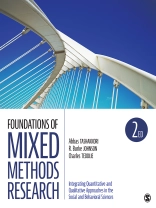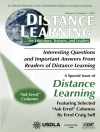The highly-anticipated second edition of the Foundations of Mixed Methods Research:Integrating Quantitative and Qualitative Approaches in the Social and Behavioral Sciences gives students a comprehensive overview of mixed methods from philosophical roots and traditions through designing, conducting, and disseminating a study. Authors Abbas Tashakkori, R. Burke Johnson, and Charles Teddlie have thoroughly updated the text to reflect the many advances over the last decade in mixed methods. New example studies throughout and a new appendix highlight the latest research on mixed methods and current best practices. New sections on evaluating quality in mixed methods studies and writing up research results round out the process of mixed methods research. The authors have added features like content summaries and objectives at the beginning of each chapter and chapter summaries and previews at the end of each chapter to aid readers in their mixed methods journey.
Students across social science, behavioral science, and health and nursing fields are now expected to be proficient in mixed methods research. This text begins with an introduction to and overview of the development of mixed methodology, and then takes students through all aspects of working with mixed methods, from research design and data collection through to analysis and conclusions. This new edition includes additional information on writing, publishing, and disseminating results, as well as information on policy impact and annotated examplars of mixed methods research studies. A new generation of mixed methods scholars can now engage with this vital text in mixed methods research.
Mục lục
Preface
Publisher’s Acknowledgments
About the Authors
Section I: Mixed Methods: The Third Methodological Movement
Chapter 1: Mixed Methods as the Third Research Community
Objectives
Three Communities of Researchers in the Social and Behavioral Sciences
An Example of How the Three Communities Approach a Research Problem
The Three Methodological Communities: Continuing Debates or Peaceful Coexistence?
Differences Among Paradigms, Methodologies, and Methods
Stages of Research: A Systems Approach
More Details Regarding the Methodological Communities
Inductive-Deductive Research Cycle (Cycle of Research Methodology)
Summary
Review Questions and Exercises
Key Terms
Chapter 2: Three Approaches to Research
Objectives
Methodological Distinctions Among the Three Communities: Continua, Not Dichotomy
Issues Related to Mixed Methods Terms and Definitions
The Utility of Mixed Methods Research
Summary
Review Questions and Exercises
Key Terms
Chapter 3: Philosophical Foundations of Mixed Methods Research
Objectives
A Review of Philosophical Issues Relevant to Paradigms
Contemporary Points of View Regarding the Use of Paradigms
Summary
Review Questions and Exercises
Key Terms
Section II: Methods and Strategies of Mixed Methods Research
Chapter 4: Inputs to the Research Process: Mixed Methods Purposes and Questions
Objectives
Introduction: The Initiation Stage of Research
Reasons for Conducting Research in the Social and Behavioral Sciences
The Emergence of Researchable Ideas in Content Areas of Interest
Conducting Literature Reviews
Generating Objectives for Mixed Methods Research
Generating Research Questions for Mixed Methods Research
Summary
Review Questions and Exercises
Key Terms
Chapter 5: Mixed Methods Research Designs
Objectives
Issues Regarding Typologies of Mixed Methods Designs
Criteria Used in Mixed Methods Research Typologies
Quasi-Mixed Methods Designs
Basic Terminology for Mixed Methods Research Designs
The Sequence-Sources Design Matrix
Popular Designs in Monomethod, Multimethod, and MM Research
Other Typologies of Mixed Methods Research Designs
Six-Step Process for Selecting or Constructing an Appropriate Mixed Methods Design
Summary
Review Questions and Exercises
Key Terms
Chapter 6: Sampling Methods and Strategies for Mixed Methods Research
Objectives
Sampling Methods and Strategies in the Social and Behavioral Sciences
Traditional Probability Sampling Methods
Traditional Purposive Sampling Methods
General Considerations Concerning Mixed Methods Sampling
Mixed Methods Sampling Approaches
Guidelines for Mixed Methods Sampling
Summary
Review Questions and Exercises
Key Terms
Chapter 7: Considerations Before Collecting Your Data
Objectives
Setting the Stage: Before You Start
Introduction to Data Collection in Mixed Methods Research
Data Quality in the Quantitative and Qualitative Strands of Mixed Methods Research
Summary
Review Questions and Exercises
Key Terms
Chapter 8: Data Collection Methods for Mixed Methods Research
Objectives
Major Data Collection Methods and Mixed Methods Research
Between-Methods Mixed Methods Data Collection
Summary
Review Questions and Exercises
Key Terms
Chapter 9: Data Analysis in Mixed Methods Research
Objectives
Analysis Strategies for Qualitative Data
Four General Types of Qualitative Data Analysis
Analysis Strategies for Quantitative Data
Strategies for Analyzing Mixed Methods Data
Applying Aspects of Analytic Frameworks of One Tradition to Data Analysis Within Another Tradition
Summary
Review Questions and Exercises
Key Terms
Chapter 10: The Inference Process in Mixed Methods Research
Objectives
Mixed Methods Research and Inferences
What Is a Research Inference?
The Process of Making Inferences
Evaluating and Maximizing the Quality of Research Inferences
A Complementary Elaboration to Our Integrative MM Framework
Transferability of Inferences in Mixed Methods Research
Summary
Review Questions and Exercises
Key Terms
Chapter 11: From Initiation to Utilization: Planning, Implementing, Writing, and Disseminating Mixed Methods Research
Objectives
From Initiation to Research Utilization
Conducting and Publishing Mixed Methods Studies
Politics, Challenges, and Prospects Facing Mixed Methods
Teaching and Learning of (Integrated) Research Methodology
Challenges and Future Directions
Summary
Review Questions and Exercises
Key Terms
Appendix: Implementing Integration in an Explanatory Sequential Mixed Methods Study of Belief Bias About Climate Change With High School Students
Glossary
References
Author Index
Subject Index
Giới thiệu về tác giả
Charles Teddlie (Ph.D., Social Psychology, University of North Carolina at Chapel Hill) is the Jo Ellen Levy Yates Distinguished Professor of Education at Louisiana State University (LSU). He has also taught at the University of New Orleans and has been a Visiting Professor at the University of Newcastle-upon-Tyne (U.K.). He has also served as Assistant Superintendent for Research and Development at the Louisiana Department of Education. His major writing interests are social science research methodology and school effectiveness research. Professor Teddlie has taught research methods courses for over twenty years, including statistics and qualitative research methods. He has been awarded the Excellence in Teaching Award from the LSU College of Education. Professor Teddlie has lectured on school effectiveness research and educational research methodology in several countries including the United Kingdom, the Republic of Ireland, the Netherlands, Norway, Denmark, Russia, the Ukraine, and Belarus.












